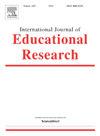Investigating the relationship between family socioeconomic status and online academic help-seeking behaviours: Internet self-efficacy as a mediator
IF 2.6
3区 教育学
Q1 EDUCATION & EDUCATIONAL RESEARCH
引用次数: 0
Abstract
Owing to the accelerated growth of higher education in China, the number of individuals pursuing higher education has been continuously increasing, leading to a growing diversity in the backgrounds of college students. Previous studies have demonstrated differences in the effectiveness of Internet usage and help-seeking behaviours among college students. However, there is limited know about the family related factors contributing to these differences. This study aimed to explore the relationship between family socioeconomic status (SES) and three types of online academic help-seeking (OAHS) behaviours: information searching, formal query and informal query. Online survey and structural equation modeling (SEM) were used. A questionnaire was completed by a total of 302 Chinese college students. The results indicated that family socioeconomic status has both direct and indirect positive effects on information searching. Although, no significant association were found between family socioeconomic status and online academic queries, family socioeconomic status could indirectly affect formal query and informal query through Internet self-efficacy. This verified a mediating effect of Internet self-efficacy on the relationship between family socioeconomic status and online academic queries. Understanding the impact of socioeconomic status on online academic help-seeking provides a new perspective for educators in shaping students’ participation in online learning and academic help-seeking. By recognizing the performance of college students from diverse family backgrounds, higher education practitioners could strategically offer targeted support to narrow the gap, thus eliminating inequality and promoting high-quality education. These efforts are in line with the United Nations Sustainable Development Goals.
求助全文
约1分钟内获得全文
求助全文
来源期刊

International Journal of Educational Research
EDUCATION & EDUCATIONAL RESEARCH-
CiteScore
6.20
自引率
3.10%
发文量
141
审稿时长
21 days
期刊介绍:
The International Journal of Educational Research publishes regular papers and special issues on specific topics of interest to international audiences of educational researchers. Examples of recent Special Issues published in the journal illustrate the breadth of topics that have be included in the journal: Students Perspectives on Learning Environments, Social, Motivational and Emotional Aspects of Learning Disabilities, Epistemological Beliefs and Domain, Analyzing Mathematics Classroom Cultures and Practices, and Music Education: A site for collaborative creativity.
 求助内容:
求助内容: 应助结果提醒方式:
应助结果提醒方式:


